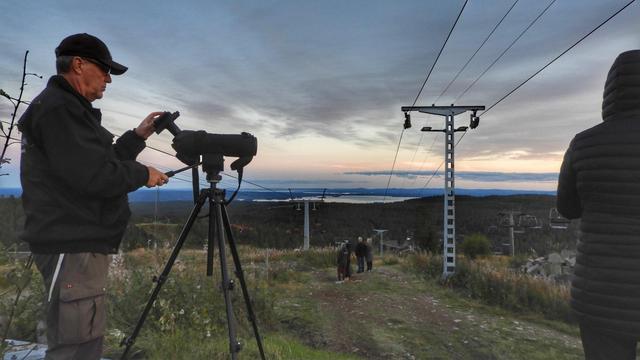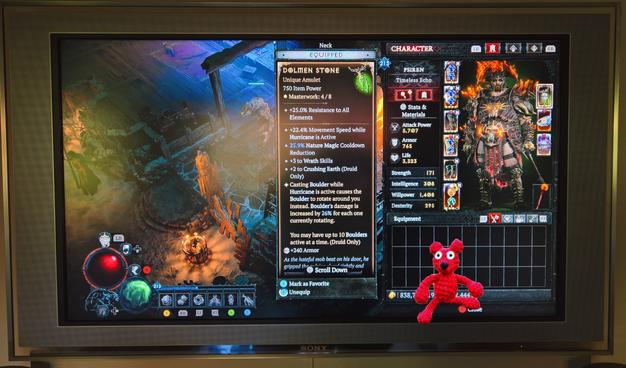The aporia or obstacle to Louise Banks’ eventual learning-to-use such 4-dimensional logic is-&-was, in the film, her own worded world—and especially (in her own worded world) her sense of herself as a particular and particularized/particularizeable ‘ᴘᴇʀꜱᴏɴ’ (rather than, instead, something or someone in #flux, in perpetual #progress or #process … that-is-to-say as an ongoing ‘#individuation’ rather than straightforward ‘#individual’). … Once her sense of straightforward self is discerned as something ‘porous’, the aporia disappears—or is at least overcome (…she becomes, as such, #over·human, #über·menschlich as Friedrich Nietzsche would have said, and she “opens up her theatre-eye—the great ‘third eye’ that looks out into the world through the other two”). This entails a kind of passivity, I suppose, since it necessitates a sort of letting-go (or what Meister Eckart, prior to Nietzsche, called Gelassenheit and Abgeschiedenheit: the ‘letting-go’ that is itself a ‘letting-be’ allowing something like the fullness—maybe the excess—of ‘be’ing its place, its play, in time).
Since in this 3-dimensional world I am currently out-of-time (having reached the maximum time-allotment for the ᴍᴏɴᴏʟᴏɢᴜᴇ part of this Babson-College session), perhaps I’ll close with reference to another film—one that wasn’t included in your readings-or-screenings (which you can view at your leisure or pleasure later on, if you feel so inclined or enlooped) followed by one last nod (one final reference) to the Illegibility readings [[love that phrase]], acknowledging-of-course (with respect to the reference to yet-another film) that I’ve made reference to a number of films that weren’t on the reading-or-screening list: films like #Dune and like #Tenet, in addition to the reading/screening-list’s #Arrival. … The other film to which I want to refer is that of Guy Ritchie’s #Revolver, which also deals with a situation wherein its protagonist (a con-man by the name of Jake Green rather than a linguist by the name of L Banks) has to overcome particular/particularized ‘personhood’, individual/indivisible ‘identity’, in order to escape the confines of his own ‘con’. In #Revolver (a film released in 2005), just as in #Arrival (released in 2016), ‘fixed’ rather than ‘fluid’ notions of ‘the self’ (—understanding ‘selfhood’ as something altogether ‘individuated’-in-the-present rather than always in-the-process-of-‘individuatɪɴɢ’—) keeps everything ‘fixed’-in (and ‘fixated’-with) the ‘ɴᴏᴡ’, inextricably ‘pinned’ or ‘bound’ to what we now think that we know, closing-off the outside, the unknown, or what I jokingly called the monstrous ‘Not-Yeti’ in my uploaded #Future_Philosophy videos. … Overcoming the self, both in the overman/overhumanism of philosophers like Nietzsche and (at least in the case of #Revolver) director/cinematographers like Guy Ritchie, opens in its negation a kind of Keatsian ‘ɴᴇɢᴀᴛɪᴠᴇ ᴄᴀᴘᴀʙɪʟɪᴛʏ’ or Meister-Eckhart-like ‘Gelassenheit’, allowing in this weird undoing—this abnormal abnegation/‘Abgeschiedenheit’—a glimpse at the surreal theatre-qua-theory of futurity ‘in formation’ (quoting William Allen, “the form-without-form of negativity’s exteriority in all its evasion-of-relation”). … The future ‘in formation’, the future in its becoming, is basically—from our 3-dimensional perspective—what the future ‘ɪꜱ’: it is #larval, both in the sense of still-#unformed (still-in-#formation), and in the more strict etymological sense of #shrouded, #clouded, covered-over or #masked.
When the philosopher René Descartes wrote (just prior to publishing his 1626 #Rules_for_the_Direction_of_Mind and 1636 #Discourse_on_Method) that he was entering onto-or-upon the great stage or theatre of World Philosophy as all actors do: that is, #masked—(his words were “larvatus prodeo”: “I advance #masked”)—he was acknowledging that his public #persona, his public #identity, was a #cover (a cover-story) underneath/behind/beyond which, in truth, lies ꜱᴏᴍᴇᴛʜɪɴɢ ᴇʟꜱᴇ. Descartes admitted that such a mask, such a masking, allows him to cover-over his shame—again, as ᴀʟʟ ‘actors’-or-‘performers’ do. In his book #Illegibility, William Allen touches upon this when he writes about what he calls “ontological shame” and explains (on page 3 of our readings) that “shame would then be the corollary of futurity.” When we speak of, or theorize, futurity—at least from our limited 3D perspective—there is (or there should be) a feeling of shame, a feeling that something is being lost or glossed-over, abandoned—perhaps because every formulation of the future denies the future its status as not-yet-formed/Not-Yeti, as if we are tired of waiting for (or ‘awaiting’) the future, and abandon the wait (the waiting) altogether. Perhaps theorists-of-futurity should be more like Didi and Gogo in Beckett’s #Waiting_for_Godot (here referring to the most well-known work of the novelist/playwright Samuel Beckett), who, even when they think of doing it (or resolve to do it) never actually stop waiting. The Irish writer Samuel Beckett and the French writer Maurice Blanchot have—or rather, had—much in common, including a fine (refined) sense of #waiting, and, in waiting, of #boredom (which the philosopher Heidegger called “the ground-mood of Being”): boredom to the point of #dread (or if you prefer, as Heidegger himself may well have, of ‘#existential dread’—for isn’t that what life’s all about?, what life really ‘is’?: a #waiting?, an #awaiting?). More to the point: isn’t this what ‘the future’—futurity—is all about? As William Allen puts it in the quotation from Blanchot’s #Awaiting_Oblivion on page 7 of our readings, “the source of all waiting [is] the future.” … This does sound very much like a 4D statement (“the source of all waiting [is] the future”), and one that throws the question of waiting into a whole new light (again from page 7 of our readings): “It is thus not a question of waiting for the event to happen … but rather of waiting as a mode of experience of that which does not take place” but nevertheless allows everything to take place (and take time). … There—thanks for allowing this little talk to take place (and take time).
* [[ᴇɴᴅ ᴏꜰ ᴍᴏɴᴏʟᴏɢᴜᴇ / ʙᴇɢɪɴɴɪɴɢ ᴏꜰ ʜᴏᴜʀ-ʟᴏɴɢ ᴄʟᴀꜱꜱ ᴅɪꜱᴄᴜꜱꜱɪᴏɴ ᴀɴᴅ ᴜɴᴘᴀᴄᴋɪɴɢ]] * :-)






